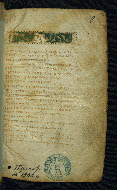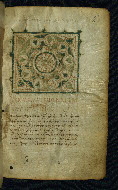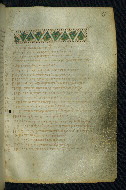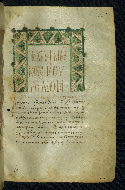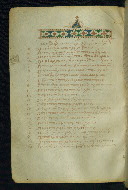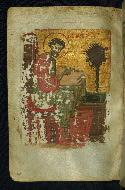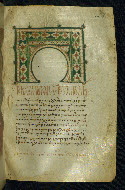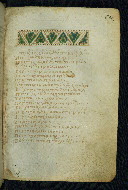Home > Digitized Walters Manuscripts
This document is a tranformation of a TEI P5 XML manuscript description incorporating images. If you have trouble reading special or non-Latin characters on this page, please make sure you have appropriate Unicode fonts installed and an up-to-date web browser.
Walters Ms. W.526, Gospels
Browse images (Browse images in a new window) | TEI in XML format
W.526
Gospels
This volume is primarily remarkable for its excellently preserved early (but not original) binding, as well as the peculiar style of its miniatures. The manuscript opens with an unusual, icon-like prefatory image of the Virgin and Child, possibly added at an early stage for use in private devotion, and is followed by Evangelist portraits facing ornate headpieces. These illuminations are important examples of non-Constantinopolitan Byzantine art.
Late 13th century CE (with one 14th-century illumination)
Byzantine Empire
As-written name: Theodoulos
Name, in vernacular: Θεόδουλος
Book
Scriptural
The primary language in this manuscript is Greek, Ancient (to 1453).
- In vernacular: Πόνος Θεοδούλου καὶ Θεοῦ Λόγου λόγοι. Εὔχεσθε πάντες ἐμοῖ τῷ παναθλίῳ ἱερομονάχῳ.
- Transliteration: Ponos Theodoulou kai Theou Logou logoi. Euchesthe pantes emoi to panathlio hieromonacho.
- Translation: Work of Theodoulos and words of God the Logos. Pray, all of you, for me the most wretched hieromonk.
Parchment
Medium-weight parchment
Foliation: i+258
Foliated in pen (probably nineteenth-century) at top right; fol. 192 missing, though no text lacking
Formula: 1(2,-2), 2(2), 3-4(8), 5(8,-3), 6-24(8), 25(4), 26-27(8), 28(2), 29-35(8), 36(2)
Catchwords: None
Signatures: In Greek numbers on interior corners at the beginning of each quire and on exterior corners at the end; probably added in the sixteenth or seventeenth century
Comments: Quires begin on fols. 1(1), 2(2), 4(3), 12(4), 20(5), 27(6), 35(7), 43(8), 51(9), 59(10), 67(11), 75(12), 83(13), 91(14), 99(15), 107(16), 115(17), 123(18), 131(19), 139(20), 147(21), 155(22), 163(23), 171(24), 179(25), 183(26), 191(27), 200(28), 202(29), 210(30), 218(31), 226(32), 234(33), 242(34), 250(35), 258(36)
11.0 cm wide by 16.8 cm high
6.8 cm wide by 11.2 cm high
- Columns: 1
- Ruled lines: 26
- Title: Gospel Book
- Contents: Fols. 2r–3r: chapters list for the Gospel of Matthew; fols. 4r–72v: Gospel of Matthew; fols. 73r–v: chapters list for the Gospel of Mark; fols. 75r–120r: Gospel of Mark; fols. 120v–122r: chapters list for the Gospel of Luke; fols. 123r–199v: Gospel of Luke; fol. 200r: Chapters list for the Gospel of John; fols. 202r–256r: Gospel of John; fol. 256r–v: verses in praise of the Evangelist John; fol. 256v: note on Gospel readings; fol. 257r: list of Gospel readings for important feasts (text defective at the beginning); fols. 257r–259r: list of Gospel readings for the immovable feasts
- Hand note: One hand throughout the manuscript; on fols. 257r–259r the script changes, as the characters become smaller and abbreviations numerous, but the hand is most likely still the same
- Decoration note: Five full-page miniatures; incipits of Gospels adorned with geometric and foliate headpieces; chapter lists marked with ornamental headbands; rubrics in light brown; text in dark brown ink
Upper board outside:
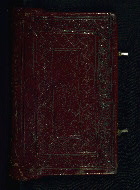
- Title: Upper board outside
- Form: Blind-tooled leather over wooden boards
- Comment:
This is not the original binding that this manuscript received after it had been copied, but it is of early date (probably from the sixteenth century) and is remarkably well preserved.
fol. 1v:
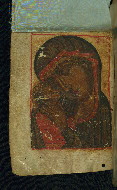
- Title: The Virgin and Child
- Form: Full-page miniature
- Comment:
The inscription reads "Mother of God" in Greek.
In style, the image is similar to an icon at the Benaki Museum in Athens (inv. 41420) and may, like it, date to the fourteenth century.
This is a very unusual subject for a pictorial frontispiece to a Gospel Book, and must have served as a devotional image.
fol. 2r:
fol. 3v:
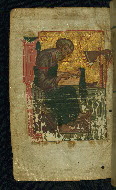
- Title: Evangelist Matthew
- Form: Full-page miniature
- Comment:
The inscription reads "St. Matthew" in Greek.
As usual, the Evangelist is shown in the act of writing his Gospel.
The stocky proportions of the figure and muted colors are typical of late thirteenth-century Byzantine art.
fol. 4r:
fol. 73r:
fol. 74v:
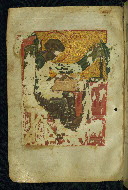
- Title: Evangelist Mark
- Form: Full-page miniature
- Comment:
The inscription reads "St. Mark" in Greek.
fol. 75r:
fol. 120v:
fol. 122v:
fol. 123r:
fol. 200r:
fol. 201v:
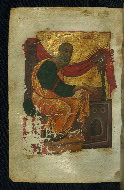
- Title: Evangelist John
- Form: Full-page miniature
- Comment:
The inscription reads "St. John the Theologian" in Greek.
fol. 202r:
The binding is not original.
Perhaps sixteenth century; tooled dark red goatskin over squared wooden boards; ornate foliate designs and roundels containing interlace inscribed on the head and fore-edge
Sophia Negroponte, Constantinople (seen by A. Papadopoulos-Kerameus in 1885)
Russian Skete of St. Andrew, Karies, Mt. Athos, 1900, by purchase (cod. 754 in its library; seen there by C. R. Gregory on March 26, 1902)
Thomas Whittemore, Paris, by purchase, after 1902
Henry Walters, Baltimore, by purchase before 1931
Walters Art Museum, 1931, by Henry Walters' bequest
Clark, K.W. A Descriptive Catalogue of Greek New Testament Manuscripts in America. Chicago: University of Chicago Press, 1937, pp. 355–357, with pls. lvii and lxxi
Spatharakis, I. Corpus of Dated Illuminated Greek Manuscripts to the Year 1453. Leiden: Brill, 1981, pp. 81–82, cat. 335, with figs. 595–596
Parpulov, G.R. “A Catalogue of the Greek Manuscripts at the Walters Art Museum.” Journal of the Walters Art Museum 62 (2004): pp. 99-102, p. 153 (fols. 1v, 74v), p. 154 (covers, including x-ray photographs, and front edge)
Principal cataloger: Parpulov, Georgi R.
Cataloger: Walters Art Museum curatorial staff and researchers since 1934
Editor: Herbert, Lynley
Copy editor: Dibble, Charles
Conservators: Owen, Linda; Quandt, Abigail
Contributors: Bockrath, Diane; Emery, Doug; Noel, William; Tabritha, Ariel; Toth, Michael B.
The Walters Art Museum
Licensed for use under Creative Commons Attribution-NonCommercial-ShareAlike 3.0 Unported Access Rights, http://creativecommons.org/licenses/by-nc-sa/3.0/legalcode. It is requested that copies of any published articles based on the information in this data set be sent to the curator of manuscripts, The Walters Art Museum, 600 North Charles Street, Baltimore MD 21201.
